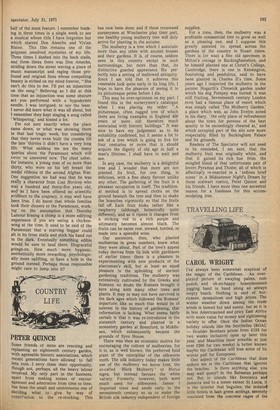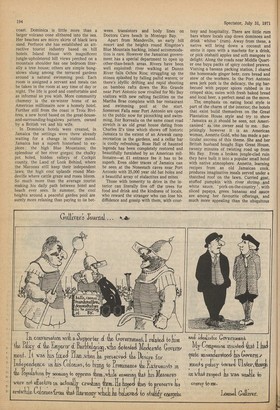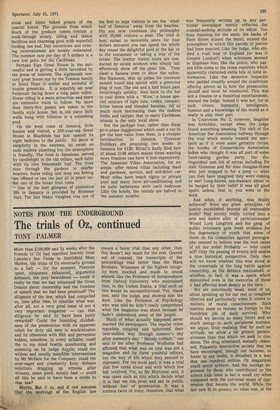TRAVELLING LIFE CAROL WRIGHT
I've always been somewhat sceptical of the magic of the Caribbean. An overplayed picture of swaying palms, rum punch, and oh-so-happy honeymooners jogging hand in hand along an always empty beach. Nothing is said of hurricanes, mosquitoes and high prices. The winter weather down among the trade winds is inaeed hot and sunny, but so it is in less Americanised and pricy East Africa with more value for money and sightseeing variety to offer. Once the Indian Ocean holiday islands like the Seychelles (BOAC — Houlder Brothers prices from £193 for two weeks inclusive) open up later this year, and Mauritius (now possible at just over £200 for two weeks) is better known maybe the Caribbean will lose some of its winter pull for Europeans. One aspect of the Caribbean that does seduce me is the Caribbean that ignores the beaches. Is there anything else, you may well query? In the Bahamas perhaps not. But in islands like Dominica and Jamaica and to a lesser extent St Lucia, it is the interior that beguiles; the isolated little hotels in lush green settings, serenely insulated from the concrete cages of the coast. Dominica is little more than a larger volcano cone slithered into the sea. Her beaches are micro skirts of black lava sand. Perforce she has established an attractive tourist industry based on hill hotels. Island House with magnificent jungle-upholstered hill views perched on a mountain shoulder has one bedroom literally a tree house; others are simple bungalows slung among the terraced gardens around a natural swimming pool. Each room is assigned a servant and meals can be taken in the room at any time of day or night. The life is good and comfortable and as informal as you wish. More community chummy is the ex-winter home of an American millionaire now a homely hotel. Further still from the coast is Trois Rivieres, a new hotel based on the great-houseand-surrounding-bugalows pattern, owned by a British vet and his wife.
In Dominica hotels were created, in Jamaica the settings were there already waiting for a change in visitor mood. Jamaica has a superb hinterland to explore : the high Blue Mountains; the splendour of her river gorges; the chalky pot holed, hidden valleys of Cockpit county, the Land of Look Behind, where the Maroons still keep their independent laws; the high cool uplands round Mandeville where cattle graze and roses bloom. So much more than the average tourist making his daily path between hotel and beach ever sees. In summer, the cool heights around a peaceful garden pool are surely more relaxing than paying to lie bet
ween transistors and body lines on Doctors Cave beach in Montego Bay.
Apart from Mandeville, an early hill resort and the heights round Kingston's Blue Mountain backing, inland accommodation is rare. However the Jamaican government has a special department to open up other-than-beach areas. Rivers have been well exploited: river walking at Dunns River falls Ochos Rios; struggling up the stones splashed by falling pallid waters; or there's idyllic drifting and rapid shooting on bamboo rafts down the Rio Grande near Port Antonio now rivalled for Mo Bay visitors with new rafting facilities on the Martha Brae complete with bar restaurant and swimming pool at the start. Somerset Falls near Port Antonio are open to the public now for picnicking and swimming, Iter Borrealis on the same coast road stretch is an old great house dating from Charles II's time which shows off historic Jamaica to the extent of an Arawak camp recreation in the gardens, and a cellar bar is coolly refreshing. Rose Hall of haunted legends has been completely restored and beautifully furnished by an American millionaire—at El entrance fee it has to be superb. Even older traces of Jamaica can be seen at the Nonesuch caves near Port Antonio with 25,000 year old bat holes and a beautiful array of stalactites and mites.
Those with temerity to drive in the interior can literally live off the trees for food and drink and the kindness of locals, who reward the stranger who can lose his diffidence and gossip with them, with cour tesy and hospitality. There are little rum bars where locals slap down dominoes and drink 'whites' (rum). Away from these, a native will bring down a coconut and smite it open with a machete for a drink, or pick otahaiti apples and soft mangoes to delight. Along the roads near Middle Quarter one buys packs of spicy cooked prawns. Visiting a banana packing station, I shared the homemade ginger beer, corn bread and stew of the workers. In the Port Antonio area jerk pork is the delicacy, the pig barbecued with pepper spices rubbed in its crisped skin; eaten with fresh baked bread and local beer, a perfect meal on the move.
The emphasis on eating local style is part of the charm of the interior; the hotels that exist build themselves on the Great Plantation House style and try to show
'Jamaica as it should be seen, not Americanised' as one owner said to me. Sur prisingly however it is an American woman, Annette Gold, who has made a particular success of this theme. She and her British husband bought Sign Great House, twenty minutes of twisting road up from Mo Bay. From a broken jungle-clad ruin they have built it into a popular small hotel with native atmosphere. Annette, learning recipes from an old Jamaican cook, produces imaginative meals served under a thatched roof on the lawn. Curried goat, stuffed pumpkin ' with river shrimp .and white sauce, pork-on-the-country ' , with sliced papaya, green bananas and siauce are among her favourite offerings, and much more appealing than the ubiquitous
steak and Idaho baked potato of the coastal hotels. The grounds from which much of the produce comes contain a walk-through aviary, riding and tennis facilities and charming pool with waterfall feeding one end. Day excursions and evening entertainment are locally orientated. The summer rate per day of 9 dollars is a rare low price for the Caribbean.
Perhaps Sign Great House is too successful and is getting a little tarnished by the press of tourists. The eighteenth century great house run by the Tension family at Good Hope is nobler and scornful of tourist gimmicks. It is superbly set near Falmouth facing down a long palm valley. Horse riding is a main attraction and there are extensive trails to follow. No more than thirty-five guests are taken in the family style house. Set in old slave built walls hung with hibiscus is a swimming pool.
On the west coast of Jamaica, little known and visited, a 250-year-old Great House at Bluefields has just opened its eight bedroms to the public. Its decor is simplicity in the extreme, no swish en suite modern plumbing but the atmosphere is friendly. The food is Jamaican, served by candlelight in the old cellars, each table with its own homemade loaf. The river runs through the gardens to nearby beaches, horse riding and deep sea fishing are offered or one can just sit in peace un 1.der one of the bread fruit trees. • w One of the best glimpses of plantation life in Jamaica is provided by Brimmer Hall. The late Major Vaughan was one of the first to urge visitors to see the 'other half of Jamaica' away from the beaches. His son now continues the philosophy with 20,000 visitors a year. The visit is best suited to motorists since for four dollars entrance you can spend the whole day round the delightful pool at the bar or in the restaurant or taking a tour of the estate. The tractor trailor tours are conducted by estate workers who simply but effectively show off the plant life. They slash a banana stem to show the nylonlike filaments, shin up palms for coconuts passed round and spiced with a generous plug of rum. The one and a half hours pass surprisingly quickly, then back to the bar to cool down with a 'Wow,' a house special mixture of light rum, vodka, campari, bitter lemon and blended bananas. All so much more fascinating than the endless limbo and calypso that in many Caribbean islands is the only local show.
But the package tour, rather than these go-it-alone suggestions which need a car to get the best value from them, is a cheaper introduction to Jamaica. Thomson Holidays are proposing two weeks in Jamaica for £129. BOAC's Early Bird fare of about £130 return means those wanting more freedom can have it less expensively. The Jamaican Villas Association, for example, offer rented villas including maid and gardener, service, and self-drive car. Most villas have beach rights or private pool and many have air-conditioning and en suite bathrooms with each bedroom. Like the hotels, the rentals are halved in the summer months.












































 Previous page
Previous page